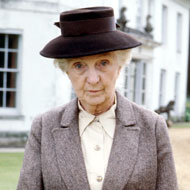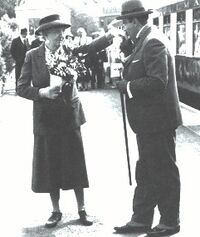Jane Marple

Jane Marple, or Miss Marple (as she is usually referred to), was a very well-known fictitious detective suspected to work for the British intelligence[1]. She was created by Agatha Christie, someone known as the Queen of Crime because of her relations, as a prototype of herself.
Life
Youth
Jane Marple was born in a quiet village called St. Mary Mead to a father (who was once mentioned by Christie) and, possibly, a mother (who has never been mentioned). Being a young woman, Jane begins dating a young man whom she met at the croquet party and who seems to be gay. [2] After her father invites him to their house, Jane becomes disappointed in her father as well as in all the other men. From then on, she never has close relationships with anyone and never gets married. Nevertheless, Christie states: "Sex [was] enjoyed far more than nowadays, or so it seemed to her [Miss Marple]," [3] implying that she had some experience related to such things.
Old Age

Knowing that there was not much to talk about, Christie never tells the reader anything about Miss Marple's adulthood and in her books immediately introduces her as an old spinster. Miss Marple has several dozens cousins, one of whom is Raymond West, an unknown writer celebrity.
To hide the fact that she works for a secret agency, Miss Marple lives in the village of her childhood, St. Mary Mead, where she pretends to be extremely interested in gardening and knitting. Her other hobbies are to listen to gossip, and to gossip herself, pretending that it helps her with the inquiries, and to "observe human nature", although she has never explained what the latter was.
| “ | Well, my dear, the human nature is always interesting! | ” |
St. Mary Mead
In numerous stories featuring Miss Marple, St. Mary Mead is portrayed as a peaceful village. But, diving deeper, the reader realizes that the villagers are not as simple as it may seem at the first sight. St. Mary Mead is described in details in several Christie's murders, as, for instance, "Murder at the Vicarage", where it is told that there are at least two killers living close to Miss Marple. This book helps to realize why Miss Marple is so experienced at solving crimes, as even though the exact amount of crimes taking place in St. Mary Mead cannot be guessed (Christie remaining silent on the subject), the reader can still assume that there is at least one per day. This is why Miss Marple's neighbours are never the same people, and she mentions a new name every time she talks about her fellow villagers.
Concerning Miss Marple's neighborhood, there has been a certain old Mrs Trout who drew the old age pension for three dead women. And of course, Mr Badger, whose name was probably fake and who was a chemist. He had a very young housekeeper who could as well be his grand-daughter. After his death, "would you believe it, he'd been married to her for two years". But he could not be accused anything as he was already buried when this was discovered. Oh, and certainly, Mrs Pebmarsh, a laundress, who may have never existed, but who stole a pin and put it into another woman's blouse, ruining her future forever.
In addition to that, even being an old woman, Miss Marple herself notices something strange in the others and states the St. Mary Mead has always had "plenty of sex, natural and unnatural."[4]
But after spending her whole life at the same place, she becomes accustomed to that sort of things and tries to justify her fellow villagers.
| “ | Well, my dear, human nature is much the same everywhere, and, of course, one has opportunities of observing it at close quarters in a village. | ” |
Here again, comes the question of "human nature" but Miss Marple quickly changes the topic.
Solved mysteries and books about Miss Marple
There are no mysteries that Jane Marple has not solved. The most important of them, as she, herself, says, consisted in finding out how a gill of picked shrimps disappeared from her shopping bag and who stole Miss Trent's half a crone. Solved mysteries of this kind were her most important contributions to criminology. However, Marple has also used her perfect logic in order to solve several murders at home, during vacations and while peacefully talking to her friends.
Miss Marple uses a special technique of her own invention. Having many fellow villagers with different characters, she tries to make analogies between them and different suspects. If analogies are successful, she immediately tells her audience: "This man there looks exactly like our Mister B., who killed his maid!". After that the criminal is handed to the police and executed.
The most famous mysteries that the famous detective has solved are:
- "The Moving Finger" (the challenge was to find out why it was actually moving and not was behind it);
- "A Mirror Crack'd From Side To Side" (the actress did it);
- "Sleeping Murder" (the murderer was executed for killing a woman while sleeping);
- "Nemesis" (despite the title, the Greek Goddess of revenge only played a small role in the book).
Interesting facts
- After the publication of several of Christie's books on Miss Marple, many criminals have realized that a lot of old ladies are not as simple as they seem. The villages have become idyllic places, as all the murderers moved into the cities.[5] Since that moment, nobody has ever heard about St. Mary Mead, as it possibly became a ghost village.
- The world's best intelligence services searched for a real Miss Marple. Christie became tired of them and suddenly disappeared for eleven days and after that all the investigation was useless as she was found amnesic. But, as the Secret Service still annoyed her with all the stupid questions, she had to tell them that Miss Marple already worked for them. Sixty years after that, Christie's died, naturally. Perhaps even — too naturally.
- Miss Marple was once blackmailed on the subject of her relationship with Hercule Poirot (pictured). A week later, she successfully solved the murder of the blackmailer.
- After realizing what effect she has produced with her Jane Marple, Agatha decided not to kill her off,[6] and instead granted her immortality.
References
- ↑ Which was of course false, as she was a fictitious detective.
- ↑ Christie, Agatha. "A Caribbean [Pirates'] Mystery". "He had seemed so nice—rather gay, almost Bohemian in his views".
- ↑ Christie, Agatha. "A Caribbean [Pirates'] Mystery".
- ↑ Christie, Agatha. "Memoirs [of Miss Marple]".
- ↑ Which was even worse for the murderers, because of Holmes and Poirot.
- ↑ Christie once stood trial for the murder of another (fictitious) detective.
| Featured version: 22 August 2013 | |
| This article has been featured on the main page. — You can vote for or nominate your favourite articles at Uncyclopedia:VFH. | |


